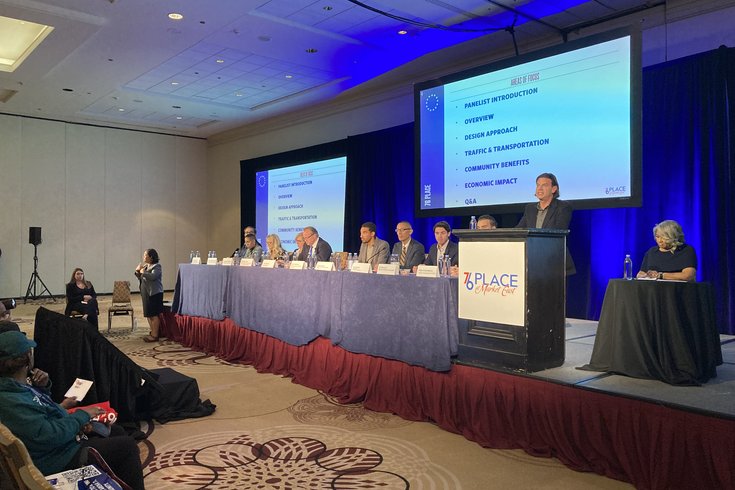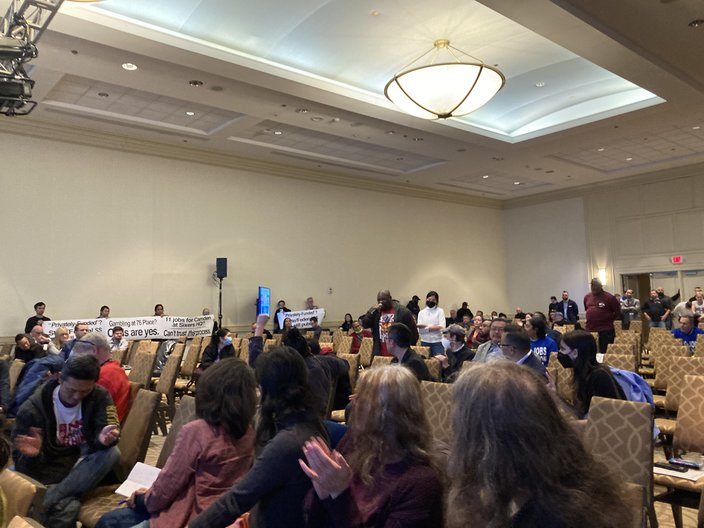
November 17, 2023
 Michael Tanenbaum/PhillyVoice
Michael Tanenbaum/PhillyVoice
Philadelphia 76ers part owner David Adelman and others spoke about the team's proposed Center City arena and answered questions from the public during a town hall Thursday at the Sheraton Philadelphia Downtown hotel.
The town hall meeting on the 76ers' proposed Market Street arena – the first held in person since December – brought more than 500 people to the Sheraton Philadelphia Downtown hotel Thursday night.
Among the central concerns raised during the session, which was hosted by the Sixers, was the $50 million community benefits agreement the team has promised. The 76ers have pledged the CBA will be the largest in Philadelphia history and will ensure the arena uplifts and protects the people who live in its shadow.
"If this project doesn't help the adjacent communities, we failed," said David Adelman, the 76ers part-owner leading the arena project.
But many community members sought greater transparency on what the CBA will include.
One Chinatown resident, who said her real estate tax bill has increased significantly since she purchased her house, wondered how the CBA would offset possible cost of living increases stemming from the arena.
"I think the community benefits package is what I really want more information about," the woman said. "You say $50 million over a 30-year lease (at the new arena). ... That's only $1.6 million a year spread across this community and others that you've talked about."
To date, 76ers officials have spoken generally about the contents of the CBA. They have mentioned rental and tax assistance for residents and businesses, investments in parking and traffic control, enhancements to neighborhood safety and cleanliness, and initiatives focused on cultural preservation and supporting communities of color.
David Gould, the 76ers' chief diversity and impact officer, said the CBA will be designed to help Chinatown and other communities near the arena, which would be built at the Fashion District Mall.
"We've been having conversations for a while, but we're just now starting to get down to the details with different community stakeholders with requests for what they'd like to see in that CBA," Gould said. "It will be done before the arena is approved."
Gould added, "I think that the city really does have a role to play here to ensure that taxes can be controlled, and that's something that we would be very supportive of."
One aspect of the CBA has been announced. The 76ers will include a $2 million fund to help local food and beverage businesses owned by people of color account for 40% of the arena's concessions. That program was ironed out with the African American Chamber of Commerce.
Gould said the team is working with other stakeholders to address their needs.
"With any negotiation, you don't really know when you're at the finish line until everybody is seeing eye to eye," Gould said in an interview Friday. "As we get to the city studies being completed, I think that in combination with the progress we've been able to make in dialogue with these groups will help to accelerate the pace we can get the CBA nailed down."
One Center City resident said she is skeptical of the obligations included in CBAs, because she's seen other developers renege on their promises without public oversight. She pointed to the Barclays Center in Brooklyn, where promises for public amenities and affordable housing have not been completed more than a decade after the arena opened. In Boston, it took three teenagers to discover that the owners of TD Garden had never fulfilled a commitment to hold annual fundraisers at the arena. The 76ers have named both of those arenas as examples of success in an NBA landscape that has increasingly focused on building in urban cores.
Gould said the 76ers would be held to a higher standard because the proposed arena site would be donated to the city and leased by the team. He said the Sixers are committed to a CBA that is legally binding.
"That lease agreement that we have with the city — the community benefits agreement would be essentially an exhibit to that, which gives the city an enforcement mechanism to hold us accountable," Gould said. "So it's not just a private agreement. There's public components of this as well."
Another man questioned whether the CBA will address increased costs of living for vulnerable groups. He said seniors, disabled people and those on fixed incomes stand to lose the most if it does not include sustained housing assistance for these groups. If they don't get help, he said they will likely be displaced.
"Despite what anybody wants to pretend, it's going to happen," the man said. "And it shouldn't happen if you guys can make everything work for everybody. I think you want to."
Members of the 76ers' development team have said they have considered housing assistance programs, though details about what they might look like and how long they could last remain unclear. As part of the arena project, the team has proposed building a mixed-income residential tower with up to 395 units, including 79 that will be designated for affordable housing.
"To put that number of units in perspective, it will be a 20% increase to the existing supply of affordable housing within the three census tracts in the surrounding area," said Leslie Smallwood-Lewis, founder of Mosaic Development Partners, which is joining the 76ers on the tower project.
Team officials also have told PhillyVoice they are interested in working with the city on the planned Chinatown Stitch project, a grant-supported initiative to build a cap over the Vine Street Expressway. The interstate highway created a physical barrier that split Chinatown in two when the highway was built in the 1960s, and the cap could enable the development of parks and other projects. The 76ers are not currently involved in planning for Chinatown Stitch.
Adelman said the 76ers are committed to learning from mistakes made in Washington, D.C., where the construction of Capital One Arena led to significant displacement in the city's Chinatown neighborhood. The Sixers' project will not involve any land taken by eminent domain, and the team argues the arena's one-for-one replacement of a section of the mall won't cause residents to be displaced.
"Let me be clear, what happened in D.C. was horrible," Adelman said. "It should never have happened and will not happen here."
Asked how the CBA might include housing assistance, Gould said Friday that team officials have discussed several options including funding tenants' right programs to help people avoid evictions or providing grants for rental assistance or tax assistance.
"We can have all the ideas in the world of what we think solutions could be, but that doesn't really matter unless the community agrees with that," Gould said. "Now we're talking more about specific solutions and what is the investment needed."
How soon the CBA will be made public is still unknown, but Gould said it's a priority of City Councilmember Mark Squilla, whose First District includes the arena site. Squilla will play a pivotal role in whether the project moves forward, since council members typically have control over what gets built in their districts.
The city has commissioned three studies examining the proposed arena's potential impact on the community, economy and transportation. Team officials said those analyses are expected to be released in December. Gould said that Squilla views the CBA as a pre-requisite for project approval.
Thursday's town hall had heavy representation from Philadelphia's building trades unions, many of which have been vocal in their support of the arena. Several union members commented about the career opportunities the project will offer in the years ahead. Gould said the team is working to make sure there is a diverse workforce for the arena's construction. The team hopes to start demolition and construction between 2026 and 2028, with the arena completed by September 2031, the year the 76ers' lease at the Wells Fargo Center expires.
"We are working with the trades to diversify pre-apprenticeship programs so that we create a more diversified line into the trades," Gould said. "By the time we break ground, there will be a more diverse labor force to pull from."
At the 76ers town hall meeting on Thursday night, some attendees came with signs questioning the team's plans for the proposed arena on East Market Street.
A number of people who attended the town hall carried signs with pointed questions about the arena's funding and other concerns, including whether it will become a future hub for sports betting. Some of them were escorted out by private security. Adelman then asked that the others be permitted to stay.
"I saw somebody with a sheet of paper saying there's questions we won't answer," Adelman said. "If those don't get asked tonight, they'll be on our website as well next week. We're not hiding. Ask your questions. It makes us better. It makes the project better."
The 76ers have committed to privately financing the $1.55 billion project without taking any public money from the city. When asked whether the team will seek state or federal money, Adelman would not make that guarantee.
"We don't need state or federal money to make this project happen," he said. "That said, if there is an incentive from the federal government, for example, to use solar power or do some new technology that exists, we might look at it."
John Chin, executive director of the nonprofit Philadelphia Chinatown Development Corp., which has been critical of the team's arena plan, said Thursday night that he's still not sold on the project. He cited concerns about construction, traffic and a "tsunami" of economic effects that may increase real estate values and taxation in the area.
"You want the best arena, the best NBA team in Philadelphia," Chin said. "For me, someone who was born in Chinatown, I want the best Chinatown in Philadelphia ... I'm not convinced that your plan will give us the best Chinatown."
To those who asked what the 76ers will do if the project isn't approved, Adelman repeated the team's intentions.
"We will not be playing in the Wells Fargo Center in 2031," Adelman said. "We will not leave Philadelphia, either."
The team has not announced any future dates for public meetings. During the summer, the 76ers held several virtual public meetings. On Friday, Gould said the team was pleased with how Thursday's event unfolded.
"On the whole, last night accomplished what we hoped it would. It provided people a forum for us to give accurate information about the project," Gould said. "It was a civil forum for people to be able to provide feedback, ask their questions and get them answered. We want a productive dialogue."
 Michael Tanenbaum/PhillyVoice
Michael Tanenbaum/PhillyVoice